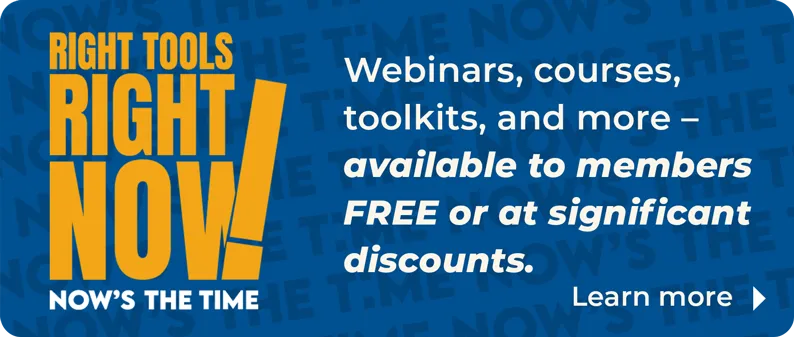By Leonard Pfeiffer
Association boards of directors often think your job is easy. When we sit with boards that have retained our executive search firm to replace a CEO (whether the person is retiring, leaving voluntarily, or being nudged out) we are continually surprised by the sheer volume of volunteer leaders who think they can do your job. How many times have you sensed that?
Today’s challenging economic times have changed association management and your communications, presentations, and overall business strategies have to change, too. Members who may have been earning $400K in 2004 are now earning $60K. The substantial tension that disparity creates in their lives will inevitably spill over onto you and your staff, particularly if they are on your board.
To keep your association strong, calm anxieties, and keep your job secure, members must feel two things: first, that there is tangible value in what they are getting from the association; second, that when times are tough, you are in it with them.
So how do you do that?
Just as your members’ mantra has been “location, location, location,” yours must be “communicate, communicate, communicate.” Nine times out of ten, when the search committee wants a new CEO, they’re looking for a better communicator. Yet, it’s a delicate balance between pompous horn blowing and selfless, graceful informing. Here are some ways to straddle the line.
Become Transparent
To make sure that your board and members respect you, they must appreciate the complexity and hard work that your job entails.
If you do your job well, directors only ever see smooth-running meetings, fancy hotels, and nice meals at restaurants. Today, you need to let them—and members— get a glimpse behind the scenes of your association. Let them know you were running around like a crazed gerbil trying to fix a meeting, update a teaching session, or handle a tax problem that popped up in the legislature. Make sure they are aware that you, too, are working hard every day on their behalf. It also doesn’t hurt for you to be in the office answering phones now and then before 8 a.m. or after 5 p.m.—members will marvel with one another at having reached you instead of a voice message.
Establish New Channels
Don’t overwhelm your board or the members with newsletters and e-mails detailing challenges and accomplishments. Instead, take a more personal approach.
Try establishing a “kitchen cabinet” of close advisers beyond your regular board committees. Pick prominent, trustworthy, up-and-coming members with whom you have established a solid rapport. Get their buy-in and let them be your disciples. Entrust them with the facts of the issues the association faces (for example, declining membership renewals) and seek their advice on how best to inform the rest of the board and the membership. They will have much more credibility than any newsletter.
Market Your Value
Next, look at all you are doing for the members in a new light. Remember Murphy’s Law? If it can be seen in a wrong light, it will. So pinpoint what could be misperceived or underappreciated. For example, when you spend association money on travel and lodging to attend a state or national meeting, make a formal presentation to elected leaders upon your return that covers what you’ve learned and why it was important for you to attend. Post a report for members on your Web site, as well.
Craft a new sensitivity about how anything you say or do, or how you present yourself or the association, can be misread by members who may be in financial stress. For example, one successful CEO was riding around in a limousine at the association’s last convention while members were in a jitney bus. The truth is that the hotel gave the CEO the limo to use for free since he had directed this meeting to the hotel. The board and members assumed the limo was an overdone extravagance. Of course, the CEO should have offered the free limo to his elected leaders. The moral of the story is that now is a good time to scale back the spending on food, hotels, travel, and anything members could perceive as perks to you or your staff.
Be in it Together
One CEO we know looked down the road six months ago and, before the board said anything, announced he was taking a temporary 10 percent pay cut. A month later, his senior staff followed suit. A month after that, all the staff took a similar temporary cut. They did it to preserve their jobs, to cut costs, and to demonstrate to the members, who were obviously hurting, that they were willing to give up some of their income, too. Maybe this wasn’t necessary to save jobs but it was a clear sign to the elected leaders and members that the association staff wasn’t going to operate “business as usual” when members were struggling.
Only Today Matters
You may remember “Only today matters” was an old ad from Eastern Airlines. The tag line was: We are only as good as our last flight. It used to seem a bit arcane to me, but now I get it. Right now, your association may not be in financial trouble because you spent years building reserves and managing it carefully. That’s quickly forgotten, though, when members are facing tough times today. Remember, you are only as good as your last success; you are only as good as the last time you helped the members.
It is not your association; you work for its members. Remind yourself of that every day.
More Tips on Showing Your Worth
Be popular.
Build strong relationships within your organization, creating the perception of you as a “team player” and enhancing your network. Try bolstering your “voice” among members with a blog, a profile on social networking Web sites, or a column in the local paper.
Document accomplishments.
Keep notes throughout the year to accurately document your achievements. Keep letters of commendation, continuing education certificates, awards, news clippings, and any other citations that bolster and quantify your contributions to the association and the community.
Save money.
Constantly look for ways to save the association money. If members are cutting back, show your solidarity by cutting back on office supplies, catered food, travel, and even utilities by conserving energy.
Leonard Pfeiffer, a 25-year veteran in the executive search business, is the founder of Leonard Pfeiffer & Company (www.pfeiffercompany.com), a retained executive search firm placing hundreds of CEOs and senior executives in organizations, including REALTOR® associations, nationwide.








